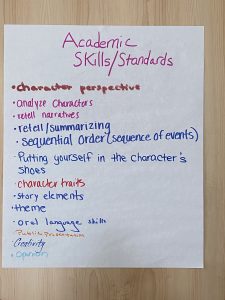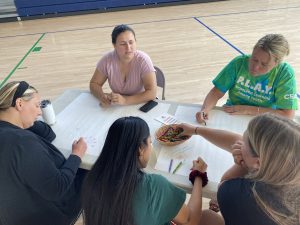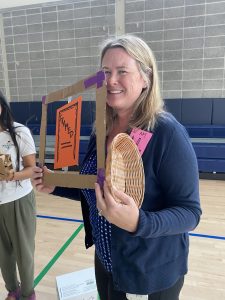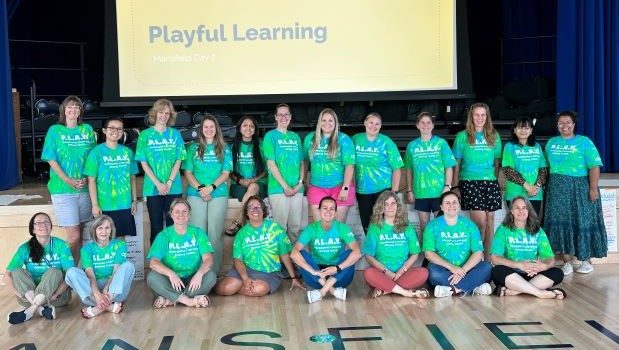When elementary school doors open this fall, teachers across Connecticut will have a new reason to celebrate. Thanks to a law CEA helped enact and implement, the early grades will see a return to play-based learning (PBL), a change that educators in Mansfield have been training and preparing for.
At a two-day institute hosted by Mansfield Public Schools in collaboration with CEA this summer, 25 educators came together to deepen their knowledge of playful learning and ways of effectively integrating it into the school day.
 The ‘what’ and ‘why’ of PBL
The ‘what’ and ‘why’ of PBL
“Separate from recess and physical education, play-based learning is purposeful play guided by teachers that can be aligned to academic or social emotional learning standards,” says CEA Teacher Development Specialist Dr. Kate Field. “Mansfield has been a leader in this movement, not only embracing play as a means of learning but also learning how and why it works.”
In addition to healthy social development and emotional regulation in young children, PBL has been shown to support academic success. Research has found, for example, that kindergartners exposed to play-based math and literacy curricula outperform their peers who receive only direct instruction in literacy and math.
How we got here
The 2001 passage of the No Child Left Behind Act marked a dramatic shift in the way young children were taught, with an overemphasis on direct instruction and the reduction or elimination of learning through play. Since then, teachers have been sounding the alarm that the loss of play-based learning often manifests in poor academic and mental health outcomes for students.
2023 legislation that CEA actively pursued and helped shape through research, testimony, coalition building, policy briefs, and more not only makes PBL a requirement in kindergarten and preschool starting with the 2024-2025 school year but also explicitly allows teachers to incorporate PBL into the instructional day in grades one through five. The law also ensures educators receive training in PBL.
 “This is a crucial win for us and our students, and we’re excited to see school districts preparing to implement it,” says CEA Vice President Joslyn DeLancey, who has advocated for and facilitated training in PBL. “Play-based learning enables young children to learn in developmentally appropriate ways, and that’s incredibly important to their academic and social-emotional success. For years, we’ve seen what it looks like when PBL is squeezed out by direct instruction, test prep, push-down curriculum, and inflexible pacing guides, leaving children anxious and stressed and leading to dysregulated behavior and poor academic outcomes.”
“This is a crucial win for us and our students, and we’re excited to see school districts preparing to implement it,” says CEA Vice President Joslyn DeLancey, who has advocated for and facilitated training in PBL. “Play-based learning enables young children to learn in developmentally appropriate ways, and that’s incredibly important to their academic and social-emotional success. For years, we’ve seen what it looks like when PBL is squeezed out by direct instruction, test prep, push-down curriculum, and inflexible pacing guides, leaving children anxious and stressed and leading to dysregulated behavior and poor academic outcomes.”
Those effects appear to have a long tail.
Educators have consistently reported that behavioral and academic struggles connected to a lack of play among young learners continue as students move through the middle and upper grades.
Next up
Schools across the state have been preparing for the shift to integrating PBL throughout the instructional day for Connecticut’s youngest students, and Mansfield has made it a top priority.
 Over the course of their two-day summer institute, Mansfield educators participated in workshops designed and facilitated by CEA staff, engaged in model PBL STEM and literature lessons and created their own, strategized on engaging families and the community, and reviewed research and resources compiled by Harvard University’s Project Zero, a research program that examines the nature of learning, creativity, intelligence, and ethics, and the practices that support their development. They also explored questions around play-based learning in a world café setting, breaking up into smaller tables of participants asking and discussing, What supports will we need? What excites us about PBL? What roadblocks might we encounter?
Over the course of their two-day summer institute, Mansfield educators participated in workshops designed and facilitated by CEA staff, engaged in model PBL STEM and literature lessons and created their own, strategized on engaging families and the community, and reviewed research and resources compiled by Harvard University’s Project Zero, a research program that examines the nature of learning, creativity, intelligence, and ethics, and the practices that support their development. They also explored questions around play-based learning in a world café setting, breaking up into smaller tables of participants asking and discussing, What supports will we need? What excites us about PBL? What roadblocks might we encounter?
“My colleagues and I had such a great time learning about various play models that we can begin to use in our classrooms,” said Sara Sroka, a second-grade teacher at the recently constructed Mansfield Elementary School, which was purposefully designed to promote play-based learning. In addition to extensive indoor and outdoor learning spaces that include a LEGO wall, pollinator garden, and STEM learning corridor, the building is also carbon neutral, and activities such as composting are part of students’ daily experiences.
“I learned that incorporating play can be as simple as making small, subtle changes in your work and lesson planning,” said Sroka, “and I’m so excited for my students to become more engaged, playful learners who communicate, share ideas, and work collaboratively on fun, exciting learning tasks.”
“Mansfield knows school and learning should be joyful,” said school principal Kate McCoy. “We fully embrace play and consider it a top priority. We understand the cognitive, social-emotional, and academic benefits of play and want to make Mansfield Elementary School an exemplar when it comes to PBL.”
“It’s so inspiring to see Mansfield’s teachers, administrators, and support staff taking the lead on this,” DeLancey noted. “These talented educators are setting a new standard for joyful, student-centered education in Connecticut, and I can’t wait to see what they do this coming school year.”
Interested in what PBL can look like in your school? Visit cea.org/professional-development/ or email [email protected] for resources and training.







